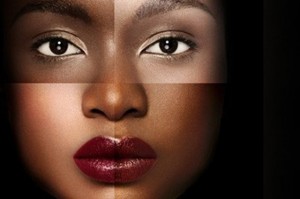(ThyBlackMan.com) There is probably nothing more culturally or psychologically annihilating within the black community than the scourge of skin bleaching (aka skin whitening). Its growing popularity is proof positive that many black people have replaced the anthem “I’m black and I’m proud” with “I’m a loser baby, so why don’t you kill me.”
Sammy Sosa, Lil’ Kim, Tamar Braxton, Trina, and even Beyonce Knowles have all been accused of lightening their skin. Recently TI’s wife Tiny underwent surgery to permanently change the color of her eyes. In many African nations skin bleaching has become so popular among many women that an entire cottage industry has arisen to address the growing demand.
It’s a two edged sword. Like any economic model there is a supply side and a demand side. On the supply side you have an increasingly fluid a la carte beauty industry that can cater to just about every client request. As long as you can pay, they can do it. You want bigger breast? Done. Flatter stomach? That’s easy. You want your entire face changed? Don’t make me laugh! You want a bigger butt, one that hovers between “wow” and “oh my God”? You got it! Eye color change? No need to worry about those cumbersome colored contacts that never looked natural in the first place. You want paler skin? Sign right here.
On the other side of the argument that people rarely want to acknowledge is the demand side. Even though we consistently hear that there are over 30 shades of black complexions, popular culture tends to promote only the lightest end of that color spectrum. Entertainers and athletes, if they choose to marry a black woman in the first place, have often paid homage to only the fairest complexioned of these black women. Rap music videos have become disgustingly predictable in their choice of which women represent an organic “hood” version of beauty. It’s so predictable in its excess that it has reached a comedic level.
30 shades of black complexions, popular culture tends to promote only the lightest end of that color spectrum. Entertainers and athletes, if they choose to marry a black woman in the first place, have often paid homage to only the fairest complexioned of these black women. Rap music videos have become disgustingly predictable in their choice of which women represent an organic “hood” version of beauty. It’s so predictable in its excess that it has reached a comedic level.
For a young, impressionable black woman who wants to get involved in this industry but doesn’t possess these attributes there are two answers: reject the ideal of beauty that is being ramrodded down the collective community’s throat and risk being ignored, or jump into the fray and surgically change their outward appearance. Unfortunately the fastest and least expensive way to attain this physical transformative goal is to lighten their skin.
The ugly reality of this growing trend is that it is not a new phenomenon at all. Skin bleaching dates back thousands of years. It was prevalent in Asian, African and Arabic cultures where lighter skin was seen as a sign of nobility. Why? Because in those societies most people, except for nobility, worked outside and were exposed to the element. Whiter, smoother skin was a sign that you didn’t work outside and were thus not exposed to the elements. In those societies only nobility could afford that luxury.
In many Asian cultures, where whiter skin is often seen as being a sign of beauty there is actually a historical context that has to be considered, one that doesn’t include European standards of beauty. There are two plausible explanations for this practice and they both have to deal with technology more than anything else.
Prior to electricity the only way for the king to see those who approached him from behind a veil was that their faces had to be painted white. The color white reflected the subtle light of candles much better than any other color. Once electricity did arrive in many parts of Asia this practice was continued as more or a tradition than a necessity.
In African and Bedouin cultures being shielded from the oppressive outdoor elements meant that you were wealthy enough to have people do that kind of work for you. Again, as technology changed traditions remained the same. Originally, lighter looking skin was a sign of wealth, not any type of solidarity with Western European standards of beauty.
Skin bleaching, in those societies, was done with make-up, lemons, dandelions, mercury and hydroquinone. Those same ingredients, albeit in a much more concentrated form, were used in skin bleaching products in the early 1900’s. With the advent of the aberrant ideology of white supremacy the new message that these products promoted was the racial superiority of a people rather than a preferred physical appearance. Stated plainly, having whiter skin, and thus looking white, made you innately more worthy than someone who didn’t possess those same physical attributes.
And that’s where many of us are still stuck.
In our post-agrarian society there is no substantive reason to attach nobility or wealth to a color. The only possible reason that some black people have an almost prurient lust for lighter complexioned skin is because their internalized self-hatred has arisen to the surface of their conscious thoughts. Those thoughts have convinced them that their milky-tanned, nearly opaque exterior in the mirror is not a circus clown but a vision of perfection.
Electing to lighten your skin and change your eye color for nothing more than aesthetics is not to be confused with medically necessary procedures. There are cases where hyperpigmentation needs to be addressed. However, lightening your skin to become part of the in crowd does not qualify as being a medically necessary procedure.
In short black people need to embrace the fullness of their pigmentation as a gift and not a curse. We are part of The Creator’s palette, perfectly placed in a visual mosaic of His creation. Everything from the deep cocoa mauves to the rich French vanillas makes us a uniquely diverse people who enhance that picture. We should not let our craziness change that.
Staff Writer; Steven Robinson
May also visit this talented writer over at; http://noroomtowiggle.wordpress.com/.




















Please read my article on this site entitled I DONT KNOW ANY BLACK PEOPLE
This is a great example of the negative past, still affecting our future. More importantly, we do this when it comes to supporting our community. We’re spending a trillion dollars a year, supporting every community but our own. This is the reason we struggle as a community and continue to rely on other people for our livelihood. Black people have to understand, this is a form of slavery, except it’s mental, not physical.
Until we break these mental chains, we will continue to struggle as a community. We can solve this problem and any other problem we have, using the money we’re already spending.
Black Unity is the solution, 3ufirst.com is the plan.
Excellent article!